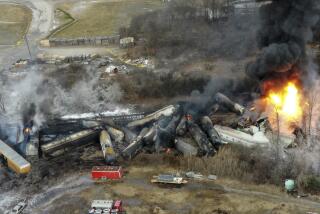Plagued by Mishaps, Britain Suffers a Wave of Train Sickness
- Share via
LONDON — No sooner does a train destination pop up on the departure screen at London’s Paddington Station than another word also appears: Delayed.
The 8:01 a.m. train to Twyford? Delayed. So are the 8:04 a.m. to Slough, the 8:18 a.m. to Langley and the 8:33 a.m. to Reading. Passengers waiting for the 8:48 a.m. to Great Malvern, 130 miles northwest of London, should be so lucky: Their train is canceled.
Rail chiefs have given up apologizing for the chaotic state of Britain’s rail network and instead are taking out full-page newspaper advertisements to humbly acknowledge that “Sorry is not enough.”
Railtrack, the private company responsible for maintaining the nation’s 20,000 miles of track and 2,500 train stations, has declared a period of “corporate mourning” and canceled all its corporate Christmas parties. Seasonal merrymaking would send the wrong message while the nation’s train services are in disarray, the company warned.
Even the rare Briton who never sets foot on a train has suffered. The Automobile Assn. says road traffic into London has increased by 25% as desperate commuters clog the roads seeking alternatives to the canceled services, lengthy delays and overcrowded carriages that have become the hallmark of Britain’s railroads in recent months.
“Getting to work is hell,” Elaine Lacon complained as she hurried through Paddington Station after her train pulled into London 20 minutes late, yet again.
“But going home is worse,” she added. “You are already tired, and then you end up standing around waiting and waiting for a train.”
Britain’s rail network, which serves about 500,000 people daily, was once the envy of the world. With the opening of the Liverpool-to-Manchester rail line in 1830, Britain could boast of inventing modern rail travel.
Twenty years later, the British beat the rest of the world again by covering the entire island with a web of interconnected lines. Passengers and freight could travel from the Scottish Highlands to the English Channel.
But in the 1990s the fabled network was privatized, and its prestige began to slip. Delays have become more common, and cars are routinely overcrowded. Train companies have faced fines for poor service, while a spate of fatal crashes has dented the public’s confidence.
The rail service plunged into a full-blown crisis beginning Oct. 17 when a high-speed intercity train jumped the tracks north of London, killing four passengers and injuring dozens.
Although far from Britain’s worst train disaster (31 people died in a crash a year earlier), it was the third fatal crash in as many years. And this time, the commuters weren’t the only ones panicking; the rail industry scared itself.
Investigators could not blame driver error--a one-time slip-up impossible to predict or prevent--but had to concede the rail infrastructure was likely at fault. The investigation zeroed in on a cracked rail at a curve in the track--a rail that had been spotted by safety inspectors earlier, scheduled for repair but never fixed, according to a preliminary government report on the accident.
“The most worrying factor is the rail was only five years old, and it broke,” said John Slater, a consultant with Railway Magazine, a monthly journal that began publishing in 1897.
“Previously, it would have been expected to survive for 25 years. So this means now they’ve got to look at every piece of rail in the country, no matter when it was put down,” he said.
Within days, Railtrack was closing entire sections of the network for urgent safety checks and enforcing new speed restrictions on potentially dangerous segments.
Commuting times doubled overnight, and some services were replaced by overcrowded buses. The train companies that operate various routes pleaded with passengers to remain patient.
Railtrack said the drastic action was necessary to put safety first, but some Britons were left wondering what the previous priorities had been if such urgent remedial action was suddenly required.
“Closing down lines at a moment’s notice when the previous day they had been regarded as safe . . . creates an impression of panic designed to drive passengers back onto the roads,” said Mick Rix, general secretary of Aslef, the train drivers’ union.
But just as Americans love and depend upon their automobiles, so it is with Britons and railroads. Abandoning the train is not really an option.
A train ride is an everyday experience. Britons travel by train to get to work, to shop at city stores, to visit relatives or friends and to go on outings around the country.
“Railways are a central part of the British sense of what it is to be British and what it is to live in Britain,” said Colin Divall, professor of railroad studies at the University of York. “They are an essential part of everyday life, but they also mean something important. Trains are still part of the national identity.”
Travel-weary Britons may be wishing it were otherwise, however.
Faced with the prospect of being rerouted 20 miles back to Leeds in November, irate commuters threatened to commandeer their train. Luckily for the driver, Leeds station was experiencing its own problems--a power failure. Consequently, the mutiny was abandoned and the commuters were left to find their own way forward.
But their anger remained.
“I have not had a train on time for six months,” said passenger Keith Norris. “People have had enough.”
Many critics blame the privatization of British Rail in the 1990s for the current mess.
Despite the misgivings of many industry experts, the Conservative Party government split the track off the rolling stock. Railtrack was created to manage the track, and 25 companies were given franchises to run passenger services around the country.
The Tories believed it would be easier to find buyers for train companies if they were relieved of responsibility for track maintenance and repairs. Selling off Railtrack to thousands of private investors also allowed the process to be completed more quickly and decisively--and made it hugely expensive for any later government to buy back control of the nation’s railroads.
“I have always said that the fragmented, adversarial, blame-culture structure of the railways, which we inherited, encouraged different parts of the industry to pull in different directions, against the interests of passengers,” said current Deputy Prime Minister John Prescott, who nevertheless has ruled out any moves to renationalize the rail industry.
The Tories, while acknowledging that some mistakes were made during privatization, accuse the current government of underfunding the rail network. They also say the government’s decision last year to remove responsibility for rail safety from Railtrack damaged industry morale and created a who-can-we-blame culture that fails to fix problems.
Railtrack’s chief executive, Gerald Corbett, resigned in November amid rising calls for his ouster. The company’s board hopes his successor, former finance director Steven Marshall, will restore public confidence, but he has less than one year’s experience in the rail industry.
Speaking in the House of Commons, Marshall assured lawmakers that regular train service would be restored by January, though safety checks and repair work would continue into the next year.
“If we can’t get our act together, we deserve shooting at the end of this,” Chris Green, chief executive of Virgin Trains, told British Broadcasting Corp.
Britons, meanwhile, are left to improvise--and that includes Queen Elizabeth II, who usually can be counted on to promote the nation’s accomplishments.
The queen was due to travel by train from London to Cambridge for a day of public engagements earlier this month, but Buckingham Palace said the monarch reluctantly made the trip by car.
The journey, normally 45 minutes, would have taken up to two hours, the palace said, and the queen might have been late for her appointments.
More to Read
Sign up for Essential California
The most important California stories and recommendations in your inbox every morning.
You may occasionally receive promotional content from the Los Angeles Times.










